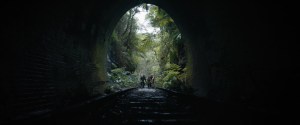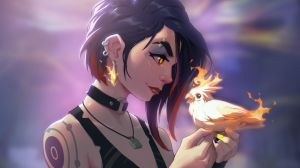While quite a lot of TV made a splash in 2020, HBO’s Lovecraft Country undeniably had a major impact. The ten-episode first season, which is inspired by Matt Ruff’s novel of the same name, chronicles the lives of an ensemble of characters in the Jim Crow America of the 1950s, as various supernatural threats and racist horrors collide. Season 1 took the concept of the novel and transformed it into something wholly new and profound, sending each of its characters on a journey they couldn’t have imagined. One of the biggest standouts of the season is undeniably Hippolyta Freeman (Aunjanue Ellis), a housewife and star-gazer whose own personal journey of self-discovery adds a sci-fi inspired and pivotal angle to the series.
Videos by ComicBook.com
With a career spanning nearly thirty years (including an Emmy-nominated performance on the limited series When They See Us), Ellis is no stranger to work that leaves an impression on its viewers. But with Lovecraft Country, Ellis’ Hippolyta quickly became a scene-stealing character, with a transformative emotional arc that is still resonating with fans months later.
In celebration of the home release of Lovecraft Country, which is available on Blu-ray and DVD starting today, ComicBook.com got to chat with Ellis about all things tied to Season 1. We spoke about the response to Season 1 (and particularly to the standout Hippolyta episode “I Am”), what she hopes to explore with the character in a potential second season, and more.
Spoilers for the entire first season of Lovecraft Country below! Only look if you want to know!

ComicBook.com: The response to Season 1 was very interesting to see, especially given the conversations about social justice and race that occurred last year. It feels like the series really came out at the absolute perfect time. What was it like for you to see that response, and to see people embrace the show and the message that it was telling?
Aunjanue Ellis: I want to believe that — no matter when the show came out — the art of the show, the art of the filmmaking, and the art of storytelling would be as exciting, even if 2020 had not happened. Even if the last 300 years had happened, to be honest with you. I want it to be that kind of timeless storytelling, that kind of timeless art-making that is not made good by the fact that it is socially and politically resonant.
However, it’s great that it is. I respond to that kind of storytelling and filmmaking, because I like to see something that doesn’t pretend. Yes it’s sci-fi. Yes, it’s horror. Yes, it’s an imagined world and world-making. But we still live in this country. We still live in the world that we live in. And I think the art of Lovecraft is successful, because of the way that it portrays these issues. There is great art and great storytelling that is about racism in America, but the way that Lovecraft is telling those stories is specific to the sci-fi genre, right? It’s specific to the horror genre. And what’s great about that, particularly, is [that] black people have been sort of erased from those genres a lot. It’s a trope that black people die within the first 15 minutes of a horror film, and it’s a trope because it’s real. It happens so often. I saw something last year, and there was a black character in it who was the leader of the show, and he was dead 20 minutes into the show.
This is what makes Lovecraft so fun for me to do. It makes it exciting to hear the response, because people — black people, particularly — they love sci-fi, they love horror. They love those genres, and they don’t see themselves in those genres, and I think they are excited to see themselves in something that they love.
That ties perfectly into my next question — in previous interviews you’ve spoken about how you love to read, and how a lot of you and your co-stars are very nerdy about specific things, and that translates onto the screen. What is it like to have Lovecraft be a show that not only reclaims black people’s role in a horror or genre space, but it also elevates black nerd culture at the same time?
Oh, I love that. Courtney [B. Vance] is a huge reader. Every day he’s sending me an epic text of an excerpt of something that he’s read. And when I say every day, I mean every day he’s sending me something like that. Jurnee [Smollett] is a huge reader and intellect. Jonathan [Majors] is as well.
Books are my friends. Susan Sontag has this great quote where she calls books her “spaceships.” That’s how books are for me, and they’ve always, always been that way for me In this room that I’m in right now, there was a rocking chair, There’s a window right here, and there was a rocking chair right there when I was growing up. And I would come in this room and this would be my spaceship. I would have these huge big books, and they were probably twice the size of my body, and I would sit in these books on rainy stormy afternoons here in Mississippi and I would be transported.
So to play a character who is, in many ways… I think all of these characters in Lovecraft are all aliens themselves. They are a part of a world that looks at them differently, and it’s not just about race. I love that we are reclaiming black nerd culture. I love that we are reclaiming that space from H.P. Lovecraft himself, who was, as you know, a virulent racist. A lot of his writing is rooted in the paranoia of black people and Jews and Asians and everybody else in the world. That was a lot of what his writing is rooted in. I’ve said this a few times and [I’m] going to continue to say this — I hope he’s somewhere turning in his grave, seeing that we are using his name in service of telling black stories.
[Hippolyta’s] solo episode in season one is so powerful and so impactful. What was it like for you to play within that space, and have your character’s emotional arc be so heavily tied to that sci-fi, expansive kind of storytelling?
Fun. It was a blast. I’ve always wanted to be in one of those in those movies where there are special effects, and you have to pretend that a dragon is chasing you. I’ve wanted to do that forever, so this was my shot. This was my shot. And I had a fantastic experience in doing that.
I love that Hippolyta is an astronomer. And I love that that was a metaphor for her journey into space. Her discovery of space, for herself, was her trying to find her space in the world, and her being an astronomer was a metaphor for that. We had to see her go on this space journey that went through time and time periods, with Josephine Baker and then in Africa and Amazon. All of this stuff that she did was just so fun to do. And to be able to say those brilliant words that were written by the writers of the show, and to say them to other black women. And to hear and to know that other black women all across this country — and women, period — heard those words and felt — as I’ve heard a thousand times from different women — heard and seen. The response that I’ve gotten from that has been really profound. I’m doing panels in the coming weeks with a film festival and a conference on women, and all of them have set aside a panel specifically inspired by that episode. It’s great. I’m so glad that I got to be a part of that.
Another aspect I really love about Season 1 is Hippolyta and Dee’s (Jada Harris) dynamic. It feels like even as the show gets to its most kind of horrific aspects there, their mother-daughter relationship is really just pure and very emotional to watch. What was it like to find that dynamic and have it evolve over the course of the season, as both of your characters are having so much happen to them?
My daughter is one of the best actors that I’ve ever worked with, period. She’s fantastic. I kind of fell in love with her anyway off-camera. So what people saw on-camera was really a reflection of how we were off-camera. She’s just a joy.
And I’m glad you mentioned that, because that was really important to me too. It was really special to me too, that their relationship was so rich and so tender and poignant, but also very complicated, especially at the end. Because Hippolyta chooses herself and abandoned Dee, and so Dee has to live with that abandonment. What happens to that relationship after a mother chooses herself? It’s like so many things in Lovecraft — it appears where it starts off one way, and then it completely blows everything up about that and turns out to be something else. I love that. I love the richness of that.
What surprised you the most while filming season one?
Everything. There was nothing. I did not take anything for granted shooting the show, and you couldn’t. We were really — for me, anyway, I can’t speak for my other castmates who might have worked on similar things before — but I’ve never worked on anything like this before. I was in uncharted territory, so every day was surprising for me. All the scripts were surprising, I would read them and I would think “How the heck are they going to do this?” I think that Misha and the writers were only limited by their imaginations. We were the arms and legs of their imaginations. There was no ceiling to what they thought of, so I was always surprised by it. I was surprised by something every day.
If Season 2 of Lovecraft does happen, what are you most excited to explore with Hippolyta?
There’s no turning back for her, and she can’t go back. She can’t go back to making pies in Chicago. This woman literally has been in space and been many selves in that in space and in different areas of time. So what would be the next phase for her? I love this idea of the multiverse. I love that idea. I like the idea that Hippolyta can inhabit many selves within herself. If there is a Season 2 — and fingers crossed that there will be a Season 2 — I hope that it goes more in that direction, of playing the different selves that are inside of this woman.
Earlier, you mentioned that you want to be in a big CGI-filled kind of movie, and some of your Lovecraft co-stars have entered the world of comic book movies. Is there a specific franchise or character that you would love to be a part of?
That’s really interesting. I kind of have, really, an expansive view about what I think of as sci-fi, what I think of as horror. I don’t want to offend, but they’re not necessarily comic books. Please forgive me. Don’t be mad.
It’s totally understandable! That’s totally okay.
I think of a writer like Toni Morrison. She writes horror. No one thinks of Toni Morrison as a horror writer, but she writes horror. So any of her characters, I would love to be a part of. And, not specifically a character, but I would love to be in something that in N. K. Jemisin writes. I would love to be a part of that kind of world-making that that she does. No offense to the comic book folks.
We totally understand. No worries. N. K. Jemisin is amazing, so we totally agree.
***
Season 1 of Lovecraft Country is now available on Blu-ray and DVD, as well as to stream on HBO Max.








